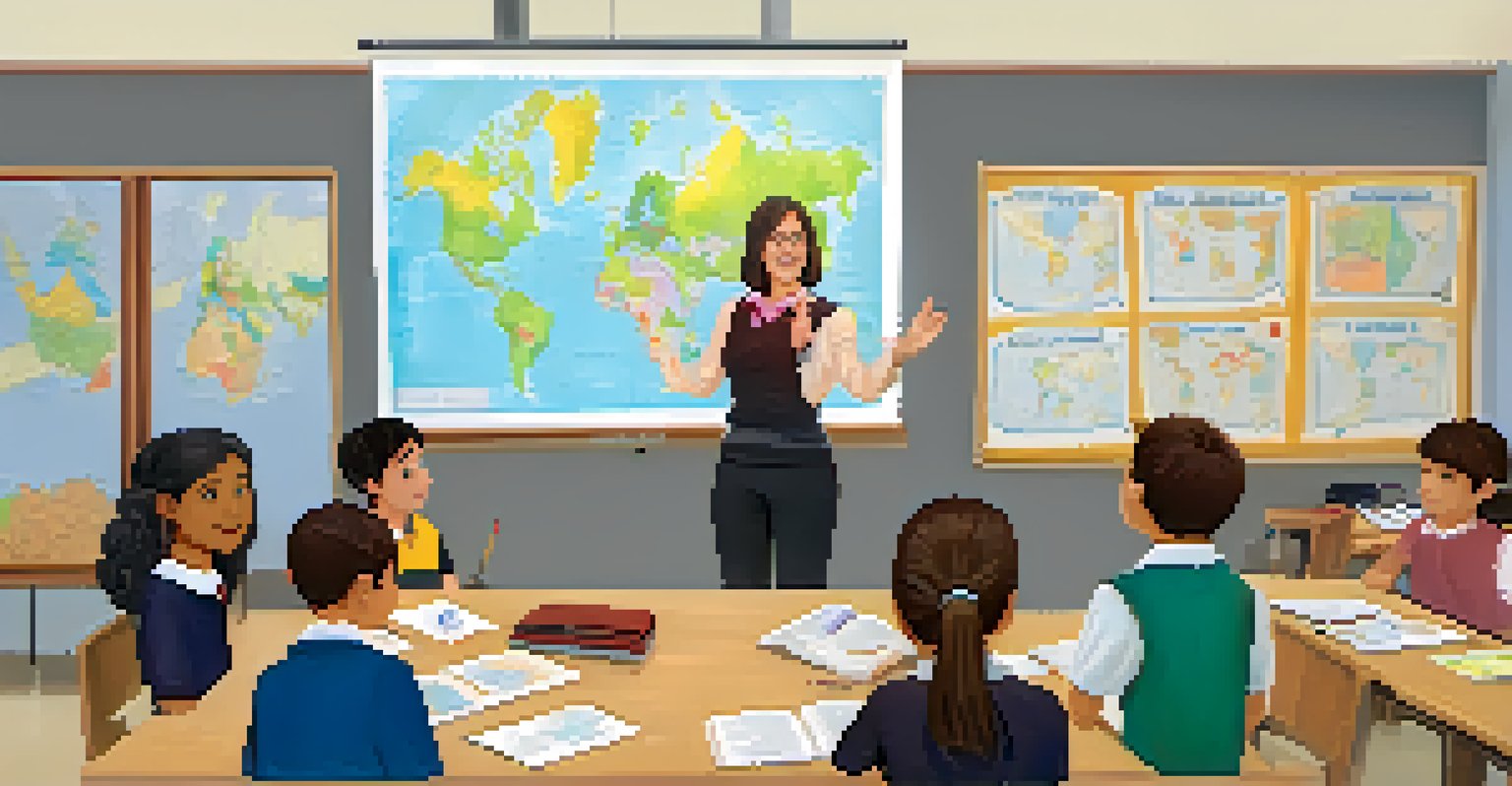Inquiry-Based Learning: Cultivating Global Citizenship in Students

Understanding Inquiry-Based Learning and Its Importance
Inquiry-based learning (IBL) is an educational approach that encourages students to ask questions, explore, and engage deeply with topics. Unlike traditional learning, where students often passively receive information, IBL empowers them to take ownership of their learning journey. This shift not only fosters curiosity but also builds critical thinking skills essential for navigating today’s complex world.
Inquiry-based learning transforms students from passive recipients of information into active seekers of knowledge.
In IBL, students start by posing questions or problems that interest them, which leads to research, exploration, and ultimately, discovery. This process encourages a sense of agency and responsibility, making learning more meaningful and relevant. As they navigate through their inquiries, students develop resilience and adaptability—traits that are crucial for global citizenship.
Moreover, IBL nurtures a collaborative environment where students learn from one another. Working in groups, they share perspectives and insights, which enriches their understanding of diverse viewpoints. This collaborative aspect is particularly vital in cultivating a sense of global citizenship, as students learn to appreciate and respect differences.
How Inquiry-Based Learning Promotes Global Awareness
One of the most significant outcomes of inquiry-based learning is heightened global awareness among students. By engaging with real-world issues, such as climate change, poverty, or social justice, students are prompted to think critically about their role in the global community. This awareness is not merely academic; it encourages students to become informed, active participants in society.

For instance, a project on sustainable development might lead students to research how their local actions impact global ecosystems. Such inquiries not only deepen their understanding but also instill a sense of responsibility towards the planet and its inhabitants. This connection between local actions and global consequences is a cornerstone of global citizenship.
Empowering Student Ownership
Inquiry-based learning fosters student agency by encouraging them to ask questions and engage deeply with real-world issues.
Additionally, IBL fosters empathy by encouraging students to explore issues from multiple perspectives. When students investigate the lives and experiences of others, particularly those from different cultural backgrounds, they are more likely to develop compassion and understanding. This empathetic approach is vital for nurturing a generation that values diversity and inclusivity.
Fostering Critical Thinking Through Inquiry-Based Learning
Critical thinking is an essential skill for global citizens, and inquiry-based learning is a powerful vehicle for its development. By encouraging students to analyze information, evaluate sources, and synthesize ideas, IBL equips them with the tools to navigate an ever-changing world. In this context, students learn not just to accept information at face value but to question and explore its validity.
The greatest danger in times of turbulence is not the turbulence; it is to act with yesterday's logic.
Consider a scenario where students investigate media portrayals of global events. Through this inquiry, they learn to discern bias and recognize the importance of multiple sources, enhancing their analytical skills. This ability to think critically about information empowers students to engage with global issues more thoughtfully and responsibly.
Moreover, the process of inquiry itself teaches students to embrace uncertainty and view challenges as opportunities for growth. This mindset is crucial in an age where information is abundant, but discernment is rare. By fostering critical thinking, IBL prepares students to tackle complex global issues with confidence and creativity.
Encouraging Collaboration and Communication Skills
Collaboration and communication are key components of inquiry-based learning, both of which are vital for global citizenship. When students work together on inquiries, they learn to articulate their ideas, listen to others, and negotiate differing viewpoints. This collaborative learning environment mirrors the real world, where teamwork is often essential to address complex challenges.
For example, a group project on global health issues might require students to combine their strengths and perspectives to find solutions. Through such experiences, they develop not only their interpersonal skills but also an appreciation for the diverse contributions of their peers. This respect for collaboration fosters a sense of community and belonging.
Building Critical Thinking Skills
IBL enhances critical thinking by teaching students to analyze information and discern biases, preparing them for complex global challenges.
Additionally, the communication skills honed during IBL can empower students to advocate for causes they believe in. Whether through presentations, debates, or written reports, students learn to express their ideas clearly and persuasively. These skills are essential for effective participation in civic life, reinforcing the idea that global citizenship involves active engagement in societal issues.
Connecting to Real-World Issues Through Inquiry
Inquiry-based learning thrives on connecting students to real-world issues, making their learning experience relevant and impactful. When students engage with pressing global challenges, they not only gain knowledge but also develop a sense of urgency and responsibility. This connection to reality enhances their understanding of the complexities of global citizenship.
For instance, students might investigate the impact of plastic pollution on marine life and communities. This inquiry not only raises awareness about environmental issues but also empowers students to brainstorm and implement solutions. Such hands-on experiences make the concept of global citizenship tangible and actionable.
By engaging with authentic issues, students also learn the value of interdisciplinary approaches. They may combine insights from science, social studies, and ethics to address a single inquiry, demonstrating how interconnected global issues truly are. This holistic understanding is crucial for developing informed global citizens.
Assessing Growth and Learning in Inquiry-Based Education
Assessing student growth in inquiry-based learning can be challenging yet rewarding. Traditional assessments often fall short of capturing the depth of understanding and skills developed through inquiry. Instead, educators are increasingly adopting alternative assessment methods that reflect students' learning journeys and their engagement with global citizenship.
For example, portfolio assessments allow students to showcase their inquiries, reflections, and collaborative projects over time. This approach not only highlights their academic progress but also emphasizes their growth as global citizens. It encourages students to take pride in their learning and recognize the value of their contributions.
Nurturing Collaboration and Empathy
Through collaborative inquiries, students develop communication skills and empathy, essential for understanding diverse perspectives and global citizenship.
Moreover, formative assessments, such as peer feedback and self-assessments, can provide insight into students' thought processes and collaborative skills. These assessments encourage a growth mindset, where students view challenges as opportunities to improve rather than obstacles. By focusing on the learning experience, educators can better support students in becoming active, informed global citizens.
The Role of Teachers in Facilitating Inquiry-Based Learning
Teachers play a crucial role in facilitating inquiry-based learning and nurturing global citizenship in students. They create an environment where curiosity is encouraged, and questions are welcomed. Rather than being the sole source of information, educators become guides, helping students navigate their inquiries and discover knowledge independently.
For instance, a teacher might introduce a complex global issue and then step back, allowing students to explore it through their own inquiries. This approach fosters independence and critical thinking, as students learn to seek out information and perspectives. Teachers can support this process by providing resources and mentorship, ensuring that students feel confident in their explorations.

Additionally, teachers are instrumental in connecting students with global communities and resources. By inviting guest speakers, organizing field trips, or facilitating online collaborations with peers worldwide, educators can enhance students' understanding of global issues. This engagement not only enriches their learning experience but also reinforces the importance of global citizenship in today's interconnected world.